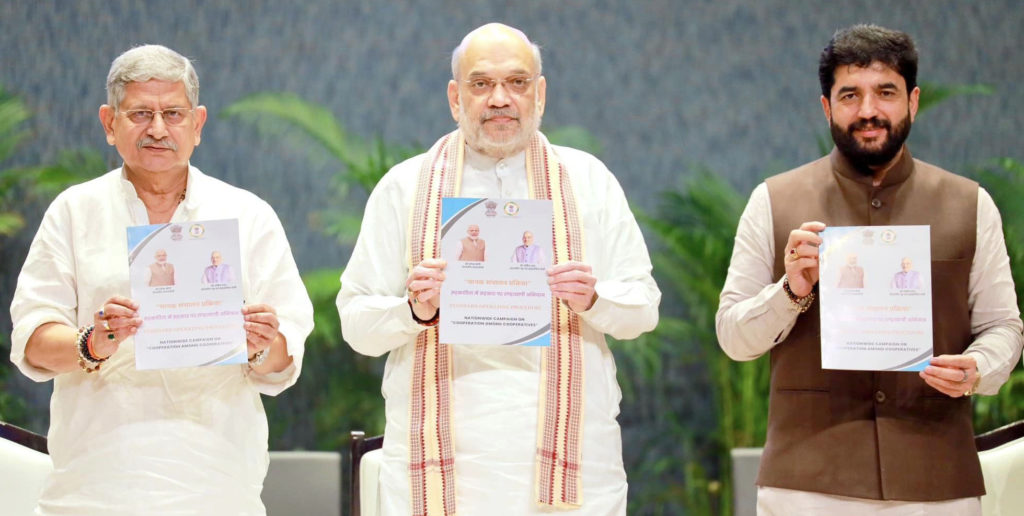On Thursday, Union Home Minister and Minister of Cooperation, Amit Shah, chaired a National Conference in New Delhi to highlight the Ministry of Cooperation’s achievements during the first 100 days of Prime Minister Narendra Modi’s third term.
Shah launched two major initiatives, the ‘Margdarshika’ for forming and strengthening 2 lakh new Multi-Purpose Agricultural Cooperative Societies (MPACS), Dairy, and Fishery Cooperatives, alongside Standard Operating Procedures (SOPs) for ‘White Revolution 2.0’ and ‘Cooperation among Cooperatives.’
Several cooperative leaders from different cooperative sectors and from across several states came to Delhi to attend the event. Dgnitaries included Union Minister for Fisheries, Animal Husbandry and Dairying and Panchayati Raj, Rajiv Ranjan Singh MoS, Muralidhar Mohol and Secretary, Ministry of Cooperation Dr. Ashish Kumar Bhutani and Pankaj Bansal along with IFFCO MD Dr U S Awasthi were present on the occasion.
Shah highlighted that the Ministry of Cooperation had taken 10 key steps within the first 100 days, with three launched during the conference. He noted that for years, there was a call for a dedicated Ministry of Cooperation to elevate the cooperative movement. This ministry now works to ensure holistic and equitable development by empowering cooperatives across 15 sectors to reach every village in India. Cooperation, he emphasized, unites individual strengths into societal capability. His vision encourages collective effort, sharing resources, overcoming weaknesses, and jointly advancing national development.
The Ministry’s primary objective is to rejuvenate cooperative institutions, ultimately providing employment to India’s 140 crore citizens. Over the past three years, more than 60 new initiatives have been rolled out to meet this goal. Shah stressed that the 10 initiatives introduced in the last 100 days will significantly strengthen the cooperative sector, building momentum for more substantial development.
Among the new initiatives is the joint proposal to establish two lakh MPACS, dairy, and fishery cooperatives
Shah also discussed transforming the role of PACS. Traditionally involved in providing short-term loans for agriculture, PACS now function in diverse sectors, including dairy, fisheries, warehouses, medicine shops, petrol pumps, and water distribution. This expanded scope strengthens the cooperative sector, ensuring that the three-tier cooperative structure—from panchayats to districts to states—thrives.
Additionally, Shah introduced the SOP for ‘White Revolution 2.0,’ a program focused on women’s empowerment through dairy initiatives. He noted that Amul, a globally recognized dairy brand, stands as a testament to the success of cooperatives in India. White Revolution 2.0 aims to continue this success by promoting women’s self-reliance and combating malnutrition.
Shah also aligned this initiative with Prime Minister Modi’s campaign for natural farming, which depends on the integration of animal husbandry. Animal dung, a vital input for natural farming, links the objectives of White Revolution 2.0 with sustainable agricultural practices. Shah assured that the government would fully support the budget for this high-priority program.
Another important initiative, ‘Cooperation among Cooperatives,’ has already yielded success in districts like Panchmahal and Banaskantha, Gujarat. Through this program, cooperative bank accounts were opened for members of cooperative societies, resulting in increased financial inclusion. Shah highlighted that more than 9 lakh accounts have been opened, with over Rs 4000 crore in deposits so far.
The Ministry’s vision, Shah concluded, includes leveraging cooperative banks, expanding dairy exports, and manufacturing dairy infrastructure equipment domestically, further driving India’s cooperative-led growth.
